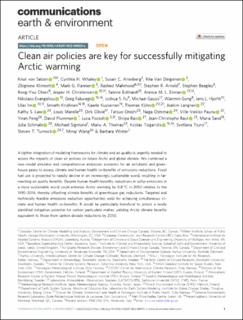| dc.contributor.author | von Salzen, Knut | |
| dc.contributor.author | Whaley, Cynthia | |
| dc.contributor.author | Anenberg, Susan C. | |
| dc.contributor.author | Van Dingenen, Rita | |
| dc.contributor.author | Klimont, Zbigniew | |
| dc.contributor.author | Flanner, Mark G. | |
| dc.contributor.author | Mahmood, Rashed | |
| dc.contributor.author | Arnold, Stephen R. | |
| dc.contributor.author | Beagley, Stephen | |
| dc.contributor.author | Chien, Rong-You | |
| dc.contributor.author | Christensen, Jesper H. | |
| dc.contributor.author | Eckhardt, Sabine | |
| dc.contributor.author | Ekman, Annica M. L. | |
| dc.contributor.author | Evangeliou, Nikolaos | |
| dc.contributor.author | Faluvegi, Greg | |
| dc.contributor.author | Fu, Joshua S. | |
| dc.contributor.author | Gauss, Michael | |
| dc.date.accessioned | 2022-10-11T07:17:35Z | |
| dc.date.available | 2022-10-11T07:17:35Z | |
| dc.date.created | 2022-10-10T11:18:47Z | |
| dc.date.issued | 2022 | |
| dc.identifier.citation | Communications Earth & Environment. 2022, 3, 222. | en_US |
| dc.identifier.issn | 2662-4435 | |
| dc.identifier.uri | https://hdl.handle.net/11250/3025242 | |
| dc.description.abstract | A tighter integration of modeling frameworks for climate and air quality is urgently needed to assess the impacts of clean air policies on future Arctic and global climate. We combined a new model emulator and comprehensive emissions scenarios for air pollutants and greenhouse gases to assess climate and human health co-benefits of emissions reductions. Fossil fuel use is projected to rapidly decline in an increasingly sustainable world, resulting in far-reaching air quality benefits. Despite human health benefits, reductions in sulfur emissions in a more sustainable world could enhance Arctic warming by 0.8 °C in 2050 relative to the 1995–2014, thereby offsetting climate benefits of greenhouse gas reductions. Targeted and technically feasible emissions reduction opportunities exist for achieving simultaneous climate and human health co-benefits. It would be particularly beneficial to unlock a newly identified mitigation potential for carbon particulate matter, yielding Arctic climate benefits equivalent to those from carbon dioxide reductions by 2050. | en_US |
| dc.language.iso | eng | en_US |
| dc.rights | Navngivelse 4.0 Internasjonal | * |
| dc.rights.uri | http://creativecommons.org/licenses/by/4.0/deed.no | * |
| dc.title | Clean air policies are key for successfully mitigating Arctic warming | en_US |
| dc.title.alternative | Clean air policies are key for successfully mitigating Arctic warming | en_US |
| dc.type | Peer reviewed | en_US |
| dc.type | Journal article | en_US |
| dc.description.version | publishedVersion | en_US |
| dc.rights.holder | © Crown 2022 | en_US |
| dc.source.volume | 3 | en_US |
| dc.source.journal | Communications Earth & Environment | en_US |
| dc.identifier.doi | 10.1038/s43247-022-00555-x | |
| dc.identifier.cristin | 2059996 | |
| dc.source.articlenumber | 222 | en_US |
| cristin.ispublished | true | |
| cristin.fulltext | original | |
| cristin.qualitycode | 1 | |

